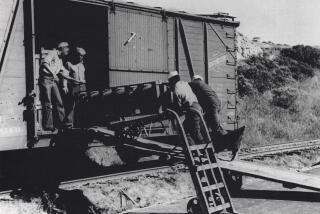Widow of Fisherman Loses Case Against Navy
- Share via
A U. S. District judge Tuesday ruled against a woman who claimed that Navy munitions were responsible for the 1986 shipwreck that killed her husband and his first mate off San Clemente Island.
“The court finds this (an explosion) is a possibility on the basis of testimony, but a possibility is not proof by a preponderance of evidence,” said J. Lawrence Irving, who heard the case without a jury.
$6.5 Million Was Sought
Cynthia Reber filed a $6.5-million suit against the government after the bodies of her husband, Boyd Reber, and his first mate, Frank Germano, were found, their boat demolished. Reber and her attorneys charged that the Navy was responsible, either through an errant missile fired during shore-bombardment exercises or unexploded ordnance Reber may have picked up in his net.
Boyd Reber was found dead March 2, 1986, and Germano the next day. They had been fishing for soupfin shark since Feb. 21 near Mail Point and dragging nets along the bottom of the ocean, where unexploded Navy ordnance is believed to rest. The area in the southern part of the island is used for the bombardment exercises.
Irving said that, because of the lack of evidence in the case, he based his decision on the evidence presented by underwater explosives expert Robert Short, a civilian consultant for the Navy.
Irving said Short’s testimony suggested that an underwater explosion would have left wreckage in a fairly small area. Wreckage from the boat, the Cindy Fay, was found partly on the beach of San Clemente Island near Mail Point; the rest was found about 1,000 feet offshore.
After the ruling, Barry Capello, attorney for Cynthia Reber, said Irving ignored a portion of Short’s testimony when he agreed that, if a huge wave were ruled out as the cause of the Cindy Fay’s destruction, an explosion was the only alternative.
An oceanographer from Scripps testified during the trial that a wave massive enough to destroy the Cindy Fay could not have existed in that area that day. It was estimated that it would have taken a 27-foot wave to swamp the boat.
Capello alleged that two Navy destroyers, the Fife and the Elliot, were firing Feb. 25 and could have accidentally hit the Cindy Fay, but because the exact time and date of the death of Reber and Germano are unknown, “The court feels this is pure speculation,” Irving said. “We don’t know when this accident happened.”
During the course of the trial, Capello also alleged that Coast Guard and Navy officials were involved in an effort to cover up the incident by bungling their investigation and disposing of needed shipwreck evidence.
In his ruling, however, Irving said there was “no credible evidence to support that.”
The ruling directly followed closing arguments given by Capello and Assistant U. S. Atty. Warren A. Schneider.
In his argument, Capello said the Navy has admitted there is live ordnance in the water but makes no effort to adequately warn civilians about the dangers of bombardment activities, as evidenced by one fisherman who testified he was awakened Feb. 25, 1986, by Navy ammunition exploding around his boat.
Another fisherman told a Coast Guard investigator that he pulled Navy ordnance from the waters in his net but then told Capello he would deny it and perjure himself rather than risk the possibility of having the area closed to fishermen.
“It is clear from the evidence before you that unexploded ordnance . . . exists at or near the point where the Cindy Fay was destroyed,” Capello told the judge. According to explosive experts who testified, the wreckage of the Cindy Fay showed clear evidence of an “explosion of high explosive nature,” Capello said.
But, in his closing statement, Schneider argued, “Nobody knows what happened to the Cindy Fay; nobody ever will know what happened to the Cindy Fay. The evidence is based on surmise with very limited facts.”
The theory that a Navy missile may have overshot the island and hit the Cindy Fay “contradicts testimony presented by naval personnel involved,” Schneider said. “There is nothing in the record to indicate this testimony is erroneous.”
Capello said he will appeal the ruling.
More to Read
Sign up for Essential California
The most important California stories and recommendations in your inbox every morning.
You may occasionally receive promotional content from the Los Angeles Times.













